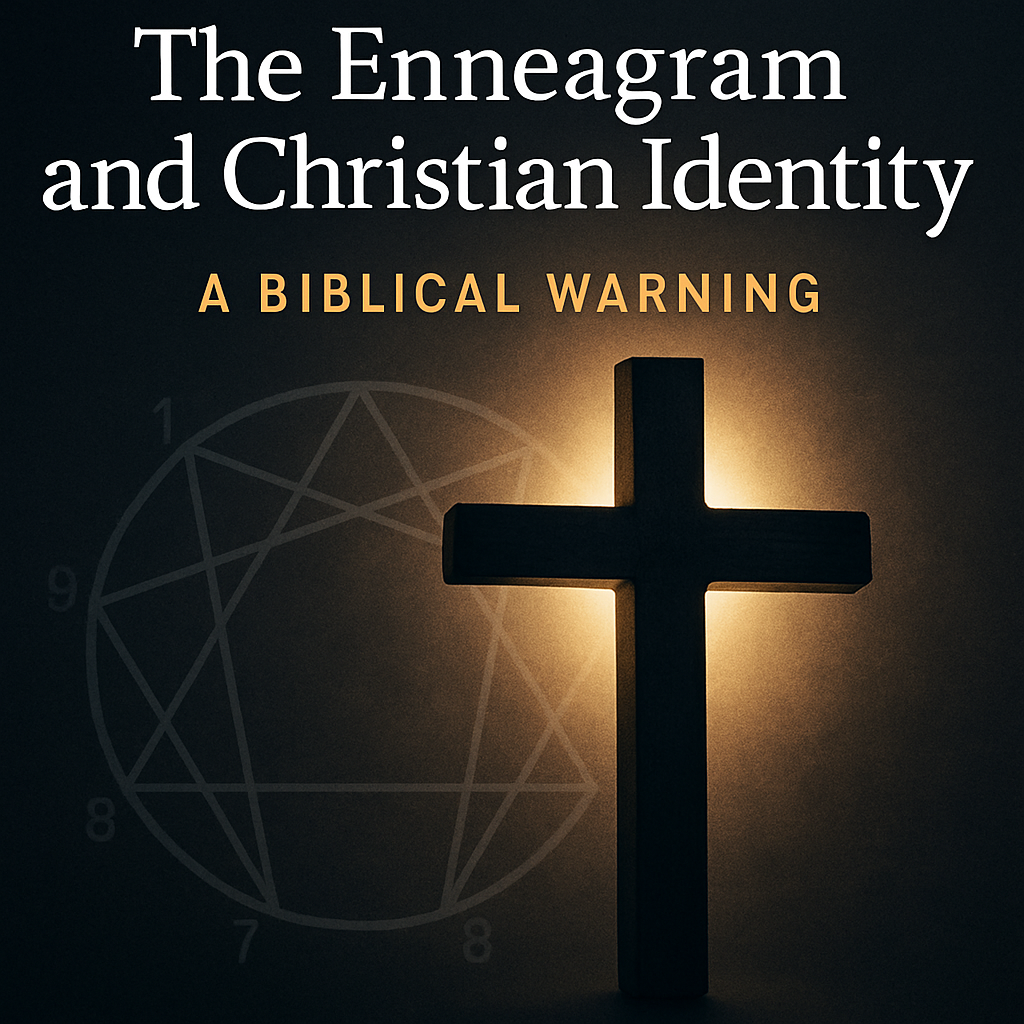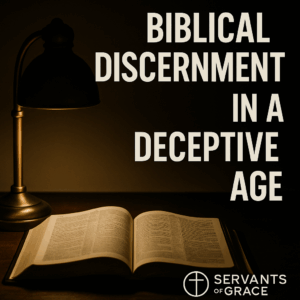⏱️ Estimated Reading Time: 5 min read
The Enneagram and Christian Identity: A Biblical Response
By Dave Jenkins
Servants of Grace
In an age obsessed with self-discovery, many Christians have turned to tools like the Enneagram and other personality tests to gain insight into themselves and others. While these tools may offer practical benefits in communication or teamwork, they raise significant spiritual and theological concerns—especially when used as identity frameworks or discipleship models.
So how should Christians think about the Enneagram? Is it harmless? Helpful? Or spiritually hazardous?
What Is the Enneagram?
The Enneagram is a personality typing system that categorizes people into nine interconnected types, each with its own motivations, fears, and behavioral patterns. It’s commonly used in churches, counseling programs, and leadership circles to promote emotional intelligence and relational growth.
Where Did the Enneagram Come From?
Though it has been rebranded for mainstream and Christian audiences, the Enneagram’s roots are deeply spiritual—and not biblical.
📚 Historical Origins
– Oscar Ichazo (1950s): A Bolivian mystic who created the original Enneagram diagram, drawing from Sufi mysticism, Gnostic teachings, and occult philosophy.
– Claudio Naranjo (1970s): A Chilean psychiatrist who introduced the nine personality types. He later claimed that he received the types through automatic writing—a practice associated with spiritism and the New Age.
This means the Enneagram wasn’t developed as a psychological tool—but as a spiritual map of the soul based on unbiblical foundations.
Is the Enneagram Just a Neutral Tool?
No. While some Christians argue that the Enneagram is “just a tool,” its spiritual framework and use in spiritual formation teachings can distort biblical truth.
When spiritual tools come from false belief systems, they’re not neutral—they’re misleading. Paul warns in Colossians 2:8:
“See to it that no one takes you captive by philosophy and empty deceit, according to human tradition, according to the elemental spirits of the world, and not according to Christ.” – Colossians 2:8
Key Concerns with the Enneagram and Personality Tests
1. Substituting Identity with Typology
Typology refers to defining a person by category rather than character. The Bible teaches that our identity is rooted in Christ—not in temperament, trauma, or traits.
“Therefore, if anyone is in Christ, he is a new creation.” – 2 Corinthians 5:17
Christians must not define themselves by Enneagram types like “Type 4” or “Type 8.” These may describe tendencies, but they do not define our redeemed identity.
2. Labeling and Justifying Sin
Statements like “I’m just a Type 9, so I avoid conflict,” often excuse sinful tendencies rather than confront them with truth.
“Do not be conformed to this world, but be transformed by the renewal of your mind.” – Romans 12:2
Sanctification means we submit every part of ourselves—including personality—to the transforming work of God.
3. Replacing Biblical Sanctification with Psychological Models
Sanctification is the Spirit-empowered process of growing in Christlikeness through obedience to God’s Word.
Many churches today are using personality assessments in small groups, counseling, and staff development—as though these tools offer more insight than the Word of God and the Spirit of God.
When psychological tools become authoritative, Scripture becomes secondary.
Our True Identity in Christ
The gospel doesn’t just forgive sin—it redefines who we are. In Christ, we are:
- Adopted children of God (Ephesians 1:5)
- New creations (2 Corinthians 5:17)
- United to Christ (Galatians 2:20)
- Citizens of heaven (Philippians 3:20)
- Indwelt by the Holy Spirit (Romans 8:9)
This identity is not based on traits, trauma, or temperament—it is based on union with Christ through faith. That’s the anchor the Enneagram can never provide.
Historical Voices on Identity
– John Calvin: “Without knowledge of God, there is no knowledge of self.” (Institutes, 1.1.1)
– Richard Sibbes: True self-examination happens “by the light of God’s Word, not the light of nature.”
– J.C. Ryle: “A right view of sin is at the root of all saving Christianity.”
From the Reformers to the Puritans, biblical self-knowledge has always started with God’s Word—not introspective typologies.
Questions for Church Leaders
- Is the Enneagram being used in your small groups, counseling, or leadership training?
- Are your people defining themselves more by personality types than their identity in Christ?
- Are any discipleship resources using Enneagram language or logic to describe spiritual growth?
This is not just a personal issue—it’s a church formation issue.
A Warning Against Drift
Even well-meaning Christians can slowly begin to merge worldly ideas with biblical truth, creating a form of spirituality that looks Christian—but lacks power. The Enneagram often acts as a Trojan horse for this kind of syncretism, especially when paired with progressive theology or contemplative spirituality.
Biblical Tools for Growth
Instead of relying on personality systems, believers grow in Christ through:
- Regular intake of God’s Word (Psalm 1:1–3)
- Spirit-led self-examination (2 Corinthians 13:5)
- Accountability in the local church (Hebrews 10:24–25)
- Prayerful submission to God’s will (Romans 12:1–2)
- Sound doctrine (Titus 2:1)
From Scripture to Soul: Reflection Questions
- Am I tempted to find meaning in personality labels rather than in Christ?
- Have I excused sinful tendencies by appealing to my “type”?
- What would it look like today to walk as a new creation in Christ?
📖 Key Scriptures for Study
- 2 Corinthians 5:17 — Identity in Christ
- Romans 12:2 — Renewing the mind
- Galatians 2:20 — Christ lives in me
- Colossians 3:1–3 — Life hidden with Christ in God
- Colossians 2:8 — Warning against worldly philosophies
For Further Study
- 🎧 The Enneagram: What’s True, What’s False, and Does it Matter?
- 📘 The Word Matters – by Dave Jenkins
- 📝 What About the Enneagram?
- 📚 The Discipline and Power of Prayer Series
🔚 Final Thoughts
The Enneagram promises insight—but only the gospel gives transformation.
As believers, we are called not to label ourselves by numbers, but to live as new creations in Christ. Any tool that distracts us from that truth—even unintentionally—should be tested, weighed, and rejected if it does not align with God’s Word.
Dave Jenkins is happily married to his wife, Sarah. He is a writer, editor, and speaker living in beautiful Southern Oregon. Dave is a lover of Christ, His people, the Church, and sound theology. He serves as the Executive Director of Servants of Grace Ministries, the Executive Editor of Theology for Life Magazine, the Host and Producer of Equipping You in Grace Podcast, and is a contributor to and producer of Contending for the Word. He is the author of The Word Explored: The Problem of Biblical Illiteracy and What To Do About It (House to House, 2021), The Word Matters: Defending Biblical Authority Against the Spirit of the Age (G3 Press, 2022), and Contentment: The Journey of a Lifetime (Theology for Life, 2024). You can find him on Facebook, Twitter, Instagram, Youtube, or read his newsletter. Dave loves to spend time with his wife, going to movies, eating at a nice restaurant, or going out for a round of golf with a good friend. He is also a voracious reader, in particular of Reformed theology, and the Puritans. You will often find him when he’s not busy with ministry reading a pile of the latest books from a wide variety of Christian publishers. Dave received his M.A.R. and M.Div through Liberty Baptist Theological Seminary.




